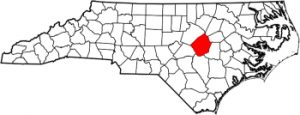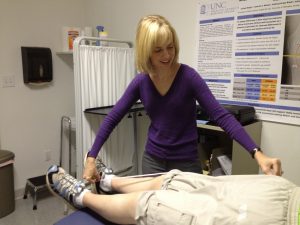Johnston County Osteoarthritis Project — Pioneering Population Based Research

Brief History
For 30 years, the Johnston County Osteoarthritis Project (JoCoOA) in Smithfield, NC has established itself as one of the premier longitudinal research studies world-wide regarding the epidemiology of osteoarthritis.
Funded by the Centers for Disease Control and Prevention (CDC), the National Institutes of Health, and multiple other sources, it is internationally recognized as the flagship study of the UNC Thurston Arthritis Research Center. It was one of the first studies in the US to examine the incidence, prevalence and progression of osteoarthritis in African American and white men and women in a rural county.
The hallmark of this study is its population-based cohort. The strength of a population-based study is that results can be applied to the general population regarding lifetime risk or prevalence of a disease.
Stability is of paramount importance in the life of a research study. The Johnston County Osteoarthritis Project has been continuously managed by the same research team, has benefited from the direction and oversight of the same Project Officer at the CDC, has had its radiographs read by a single musculoskeletal radiologist, and the majority of its interviewers and research clinic examiners have been with the study for a decade or more.
Recently, the Johnston County Osteoarthritis Project received renewed funding from the CDC that extends to 2021. Enrollment was opened in 2019 to new participants to address naturally-occurring attrition over the past two and a half decades. The new enrollment includes a younger cohort of participants, starting at age 35, and White, African American, and for the first time, Hispanic men and women. Learn more about the Johnston County Health Study, which is examining how osteoarthritis is related to other health conditions such as injury, obesity, diabetes, and heart disease, by visiting the study’s website.
JoCoOA Leadership at UNC:
Amanda Nelson, MD, MSCR, RhMSUS
Associate Professor of Medicine
Dr. Nelson is a board-certified internist and rheumatologist with a Master degree in Clinical Research in epidemiology. She directs the Musculoskeletal Ultrasound Clinic at the UNC Rheumatology Clinic, and is involved in the education of physicians pursuing Fellowships. Dr. Nelson’s research is focused on a variety of aspects of imaging in osteoarthritis (OA), including the contribution of bone shape to OA risk, novel methodologies for analysis of imaging data, and assessment of whole-body burden of OA. She has also conducted research involving serum biomarkers for OA, and investigated racial and gender differences in imaging and other aspects of OA.
Yvonne Golightly, PT, MS, PhD
Associate Professor of Epidemiology
Dr. Golightly’s research focuses on OA, injury, musculoskeletal disorders, joint pain, exercise/physical activity for OA, and disability. Since 2006, she has led multiple studies in the Johnston County Osteoarthritis Project to examine lower body OA, leg length inequality, foot problems, falls, and serum biomarkers of OA. She currently has an award (RO1) from the National Institutes of Health (NIH) to study how joint hypermobility relates to OA and pain using data from the Johnston County Osteoarthritis Project, the Genetics of Osteoarthritis study, and the Genetics of Generalized Osteoarthritis study. Additionally, Dr. Golightly is interested in developing treatments and prevention strategies for OA. She and Dr. Abbie Smith-Ryan (UNC Exercise and Sport Science) are currently examining high-intensity interval training as a rehabilitation exercise approach for knee OA (supported by NIH R21).
Scope of Work

The Johnston County Osteoarthritis Project is home to a vast repository of radiographic, genetic, clinical, behavioral, psychosocial and social determinants data. Data have been collected on knees, hips, hands, spine, feet and ankles. Numerous collaborative studies to date have been successfully executed, creating new analytical data sets spanning 7,500 participants. These data sets serve as an invaluable library for secondary analyses that have, in turn, produced hundreds of publications across diverse disciplines, including health behavior, orthopedics, exercise & sport science, and physical therapy – to name a few. This project provides an optimal training ground for new researchers, including rheumatology fellows, medical and graduate students, and junior faculty.
Publications from the Johnston County Osteoarthritis Project, and other osteoarthritis-related work
View Here
JoCoOA Newsletter
View Here